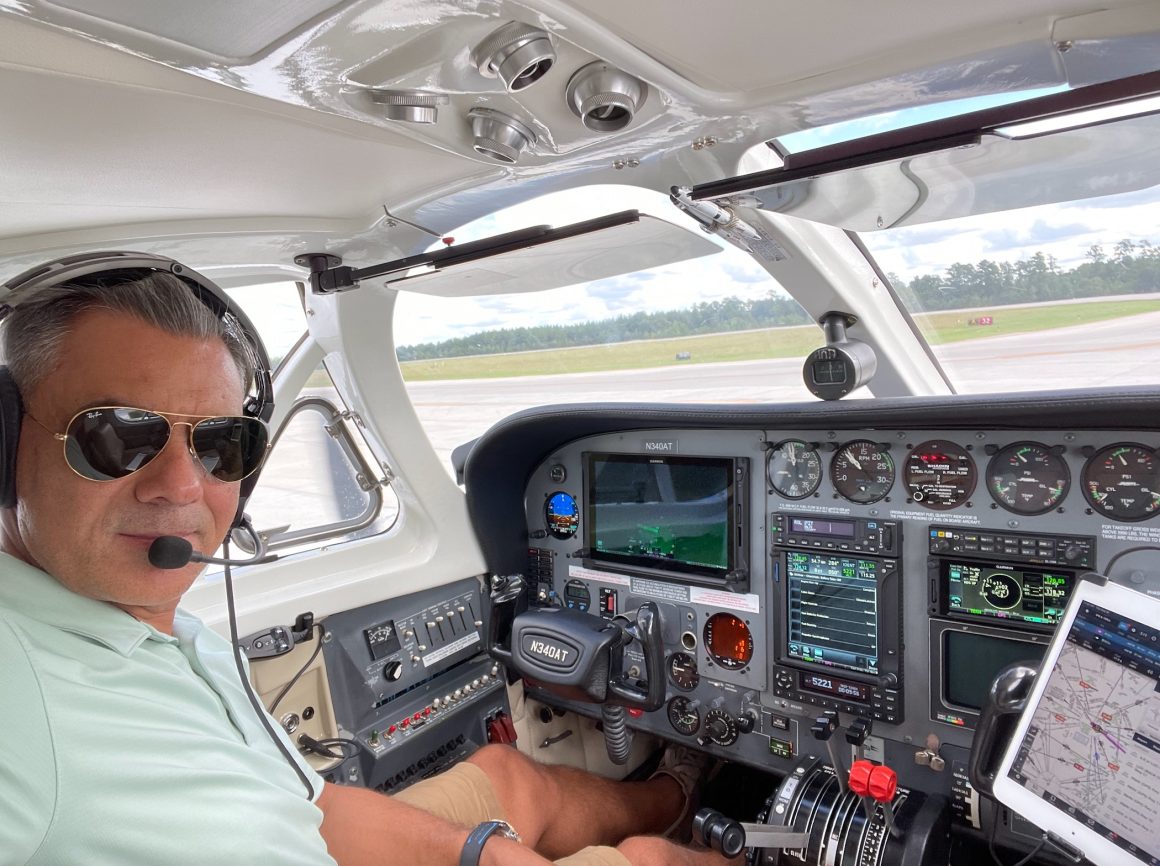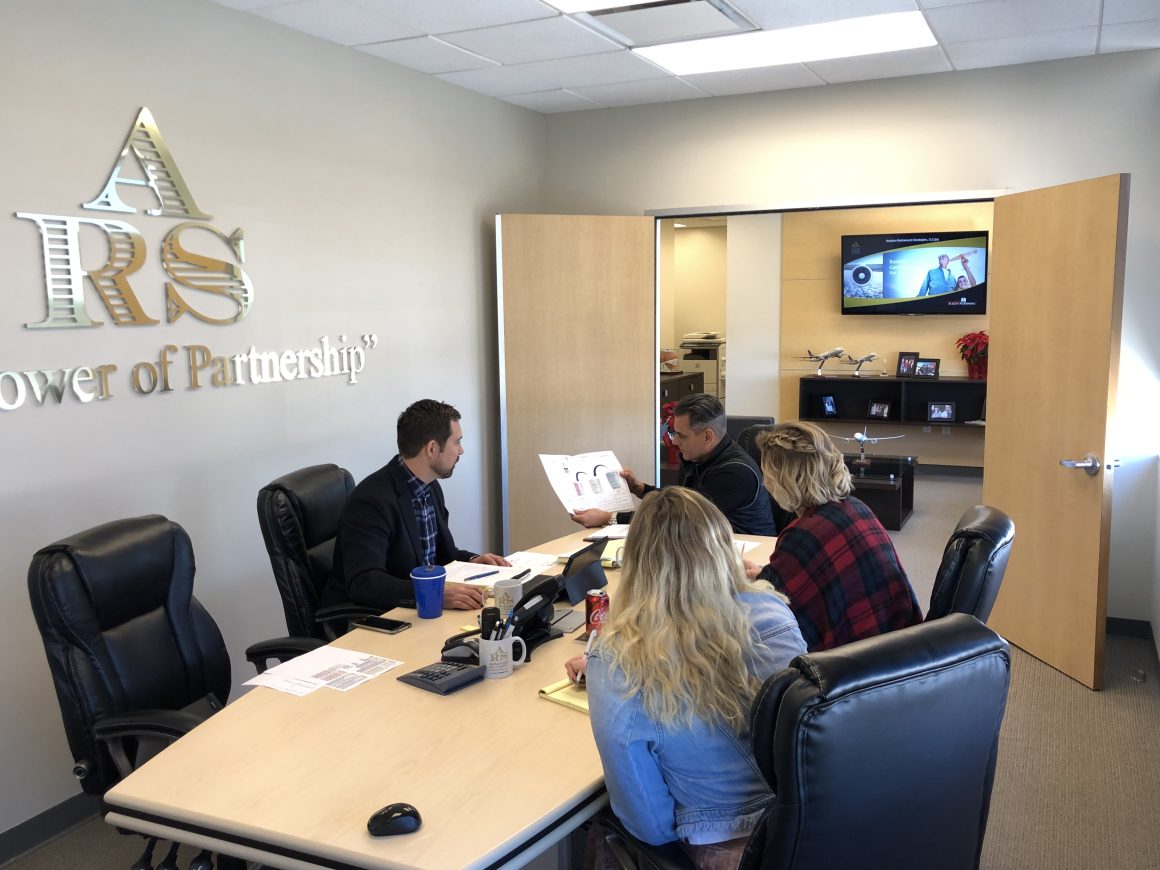Alex Tapia of Aviation Retirement Strategies shares six practical ways that pilots and airline professionals can prepare themselves for retirement.
Whether you’re a new pilot, or you’re close to retirement, it is important to plan for your financial future. And if you’re a pilot, you have incredible benefits available to you.
Stick with an airline long enough and you’re basically guaranteed to make millions but you are not guaranteed to become (and stay) a millionaire.
Unfortunately, many people don’t take full advantage of the wide array of benefits available to them to help them plan for the future.
Is that something that worries you? How will you avoid being in that position? Here are six important tips from Alex A. Tapia, AIF® to help pilots plan for their financial future.

1. Talk to A Professional About Your Benefits
It is important to sit down with a competent professional and come up with a holistic plan for your future. Have them show you how to properly participate in the benefits available to you. Together, figure out what you have, what you need to do, what you need to consolidate and/or get rid of, and come up with a plan as to how to actually optimize your benefits. Like pieces of a puzzle, arranging them in such a way that they all fit together and are representative of your unique financial life.
So many pilots have found themselves in a situation out of their control. Maybe it’s a flawed tax strategy. Perhaps they don’t have enough money to last through retirement. Or maybe it’s a lack of cohesive end-of-life transfer of wealth. They don’t get into these situations because they’re not competent. Rather, it’s because nobody has ever provided them with the knowledge to properly apply these benefits in the real world.
Finally, be wary about the financial planner you choose to talk to. Ensure they have your best interest in mind and that they’re not just trying to sell you something. Some financial planners, particularly at larger companies, won’t provide you with unbiased advice because they are under tremendous pressure to simply produce.
2. Sacrifice Now, Reap Your Rewards Later
From the moment you’re hired, contribute the maximum amount you can to your 401(K). Come to terms with the fact that while the money may not be going into your bank account, it is going into your 401(K). Prepare yourself psychologically for this and understand that this is what you need to do to be able to retire on your own terms at age 65.
Will it hurt at first? You bet. It’s a huge sacrifice. But, as a pilot, it won’t last long because you will start making great money relatively quickly.
There are so many examples of people who didn’t properly plan ahead. And every single time, they regret not doing something sooner. Put money into vehicles that will provide for your financial future down the road. It’s one of the most important things you’ll ever do.
3. Fees Matter
One of the biggest mistakes we’ve seen in the past is that many investors overpay for their investments, or simply are not aware of what they are paying. It is common for someone to pay north of 2% in fees, of which maybe they are only aware of half of that fee.
Much like operating a finely tuned engine, portfolio efficiency is a crucial element of performance success. Many of the larger investment companies use commissioned products, like retail mutual funds, that are loaded with fees, which more often than not are not disclosed to the investor. Even most “fee-based” firms, that charge a percentage for the management of portfolios will use mutual funds, which not only carry additional internal costs, often more than the original fee being charged. Mutual fund companies also pay the firm something called 12b-1 fees, which are like ongoing commissions, which also add to the cost for the investor. A true fiduciary money manager will try and use individual stocks and ETFs to avoid these extra fees whenever possible. At the end of the day, if all things are equal, the lower-cost portfolio will always outperform the commissioned broker/advisor at the larger firms that sell primarily mutual funds. Unfortunately, this is the world in which most investors reside, simply because they are not being properly educated on how the investment world works, from a fee standpoint. If your portfolio consists of primarily mutual funds, chances are that you are paying too much.
4. Set It and Forget It
So you’re taking full advantage of the benefits available to you? You’re contributing the maximum amount to your 401(K)? Great!
Now turn off the news. Ignore the noise. TV and radio programs are designed to grab your attention to sell commercials. Talking heads, even if well-meaning, can only give generalized advice… not specific to YOUR personal financial situation.Tapia always reminds everyone, that even though as pilots, we have much in common, once we step away from the cockpit, our lives are completely different from each other. Our financial lives especially, are as unique as our own fingerprints.
Once your money is in a solid portfolio without excess fees, just forget about it. Don’t worry about the markets or what is happening in the world around you. Let a financial planner handle the business end of your flying career. You just need to contribute.
Historically, markets always grow over time. Regardless of who is in power or what administration is in charge, the economy always prevails. We’ve seen it time and time again through the years. And it’s the way it will always be. “Remember, your investments behave like the weather, changing all time. Our economy is like the climate, changing much more gradually and predictably. In the short run it’s the weather that gets our attention and appears to determine our environment, but in the long run it’s the climate that really counts”.
Understand that no matter what is happening in the world today, it will be irrelevant two years from now. We will all have forgotten by then. So just go to work and make the money. The market always has more gains than retreats. It grows. So if you’re in it for the long term, you’ll always win.
People like me can’t guarantee much in this world. However, I can guarantee that you will make money if you give yourself enough time to do so. That’s why it is so important to start early.
Set it and forget it. And stop listening to the noise.
5. Who You Choose to Manage Your Money is Important

It is critical that you take the time to find the right adviser to help plan your financial future. Ensure that it is somebody you can meet personally. Don’t do it over the phone. Although the airlines offer retirement planning services, it is usually not with the same person you can talk to personally over the course of the year.
Choose someone who is independent and ensure they are an investment fiduciary. There is a big difference between saying you are a fiduciary and actually being one. Look for someone with AIF (Accredited Investment Fiduciary) behind their name. With that designation, amongst others, they are required by law to put the client first.
These professionals will look at your whole picture. And unlike insurance companies or large, national investment firms, they will look at your entire financial life. They won’t sell you a bunch of expensive mutual funds or get you into a mediocre product just for the sake of meeting a quota.
So do your research and find a fiduciary company like Aviation Retirement Strategies, or simply a firm with whom you get along. If you don’t like the person or the firm, the relationship will suffer. Authentic financial planning is very relationship-oriented, so it is vital that you get along together. Make sure it is somebody you can call, somebody you enjoy talking to, and somebody who won’t roll their eyes when your caller ID comes up on their phone. Be sure it is someone who is proactive and understands the uniqueness of your aviation career.
Remember, most financial planners have no idea what the airlines are all about. Think of it this way: most of us don’t understand what brain surgeons go through on a daily basis. Similarly, most people don’t understand what pilots go through daily. They also don’t know the benefits and financial options available to pilots and how they all work together.
Finding somebody like that is vital for pilots. That way, you can actually get real advice and real guidance based on your specific company benefits and lifestyle.
6. Forget About the Past and Just Look Forward
As humans, we are psychologically wired to regret our past and remember our mistakes. When it comes to your financial future, you must put that aside for your own sanity.
If you didn’t prepare well, and you’re close to retirement, forget about what you didn’t do in the past. Figure out the best way to move forward today. That’s what counts. There is no going back.
Life comes at you quickly, especially for pilots, who are always looking ahead to their next bid cycle or their climb up the seniority list. They’re cruising along and, suddenly, they think to themselves, ‘wow, I need to retire. I need to figure this out. How will I live?’

So they come to somebody like me and they say, ‘Hey, I haven’t done anything to prepare. What do I do?’ And we’ll sit down with them and look at it backward. We figure out what they need. Then, based on what they have, we figure out what tools are available to make that happen in the best way possible.
There are three phases in your financial life: accumulation, distribution, and transfer. At retirement, you live off of the assets you’ve accumulated. But they still need to grow. And with everything going on in today’s world, it becomes more difficult to grow a portfolio while you are using it to support your income needs. If managed correctly, your money will outlive you. A true professional will work with you to ensure you will be well-positioned for retirement. Then, you’ll get to that last phase of life, and everything will transfer according to your wishes – not someone else’s. Creating a strategy to make all three phases happen at the same time is crucial to your long-term financial success.
Pilots are hardworking, competent professionals. They have earned the Privilege of Being Able to Retire in Comfort
Creating a plan with a financial planner is critical for your future. Much like preparing for every contingency as a pilot, so too must you plan for every contingency for your financial health. That way, when something unexpected happens, it is just a nuisance rather than an emergency.
You’ve worked hard to get to where you are. Don’t put yourself in an emergency situation that will rob you of the joy and comfort you have earned after a long and successful career.
FOR MORE INFORMATION: Alex Tapia is the president and founder of Aviation Retirement Strategies in Houston, Texas. He and his wife Dana live in Spring, Texas with their daughter Alexa, and twin boys Adrian and Jaden. To learn more about Aviation Retirement Strategies, visit PilotMoney.com.
